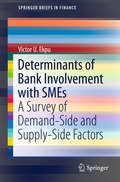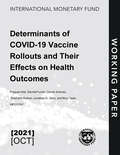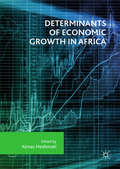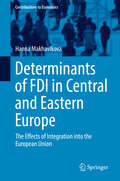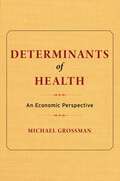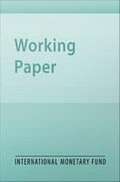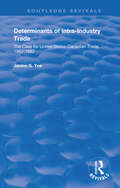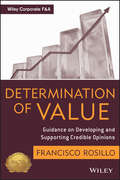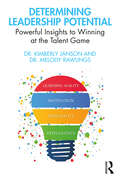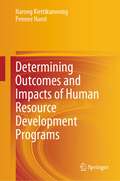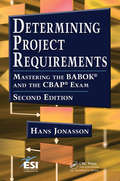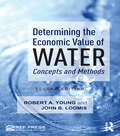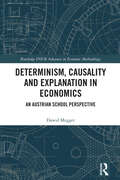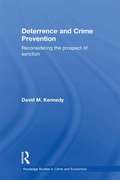- Table View
- List View
Determinants and Macroeconomic Impact of Remittances in Sub-Saharan Africa
by Markus Haacker Raju Jan Singh Kyung-Woo LeeA report from the International Monetary Fund.
Determinants and Stratification of Household Carbon Footprint: Understanding the Prospect for Climate Change Mitigation and Socioeconomic Co-benefits
by Sunil Nautiyal Mrinalini Goswami A PremkumarThis book provides comprehensive insights into the socioeconomic systems, carbon accounting, and consumption-expenditure frameworks influencing household carbon footprints (HCF) in a developing economy. It offers a unique perspective on the link between socioeconomic classes, agro-ecological zones, and carbon emissions, specifically in the Indian context. Household consumption patterns play a critical role in determining greenhouse gas emissions and are increasingly recognized as vital for shaping effective climate policies. Various socio-economic, demographic, and lifestyle factors—such as household size, income, food habits, mobility choices, waste management practices, home appliances, and education—significantly impact HCF. While the IPCC mitigation framework focuses extensively on direct emissions from energy and product production, this book emphasizes indirect emissions driven by lifestyle choices and end-use consumption. The book is based on a PAN-India study across 13 diverse locations within nine agro-ecological regions, examining the socioeconomic and geo-climatic determinants of household carbon emissions. It explores the income-consumption relationship, providing strategies to leverage these insights for targeted decarbonization and sustainable development. Additionally, the book addresses the behavioral aspects of carbon footprints and offers policy recommendations to promote a "carbon handprint"—advocating for carbon-friendly behaviors and solutions that are socially acceptable. By segregating emissions from production and consumption, it aims to guide the development of comprehensive emission reduction strategies for various consumables. This volume is an essential resource for students, researchers, and policymakers interested in sustainable consumption, climate mitigation, and the socio-economic dimensions of carbon emissions in developing countries.
Determinants of Bank Involvement with SMEs
by Victor U. EkpuThis book is a comprehensive, yet concise text that brings together all aspects of SME banking theories and empirical studies in one text. The book contains the latest policy debates on money creation and credit rationing and the relative role of demand-side and supply-side factors affecting SME financing. Readers will understand the borrower-specific, lender-specific and business environment drivers of bank finance for SMEs as well as the determinants of loan contract terms, particularly the risk premium and collateral. Readers will also understand how loan officers acquire proprietary information on SMEs and apply various lending techniques, such as financial statement lending, relationship lending and credit scoring to the loan underwriting process. In addition, the book also features recent trends on the rise of alternative finance intermediaries such as online peer-to-peer lenders and the competitive implications for traditional banks providing loans to SMEs. Findings from this work will thus be of particular interest to commercial bankers, bank-dependent small business borrowers as well as policy makers, and researchers in central banks, development banks, development agencies and international financial institutions.
Determinants of COVID-19 Vaccine Rollouts and Their Effects on Health Outcomes (Imf Working Papers)
by Pragyan Deb, Davide Furceri, Daniel Jimenez, Siddharth Kothari, Jonathan D. Ostry, and Nour TawkA report from the International Monetary Fund.
Determinants of China's Private Consumption: An International Perspective
by Papa N'Diaye Kai GuoA report from the International Monetary Fund.
Determinants of Economic Growth in Africa
by Almas HeshmatiThis volume is a collection of selected empirical studies on determinants of economic growth in Africa. Grouped into three parts, chapters examine the influence of financial sources and economic growth; sources of productivity growth; and prices, exchange rates and trade relationships with growth in regions in Africa or the continent as a whole. This edited book is authored by African experts in the field who employ diverse up-to-date data and methods to provide robust empirical results based on representative firms, household surveys and secondary country level data covering individuals or multiple countries on the continent. It contains a wealth of empirical evidence, deep analyses and sound recommendations for policymakers and researchers for designing and implementing effective social and national policies and strategies to prevent and to reduce poverty and its negative effects on poor households and in poor regions. The volume will be a useful resource for policymakers and researchers involved in promoting economic growth and fighting poverty. It will also appeal to a broader audience interested in economic development, resource economics, policies, economic welfare and inclusive growth.
Determinants of FDI in Central and Eastern Europe: The Effects of Integration into the European Union (Contributions to Economics)
by Hanna MakhavikovaThis book provides a detailed examination of foreign direct investment (FDI) inflows in Central and Eastern Europe (CEE) after closer integration in the European Union. An important facet of European economic integration was the development of a free-trade area in Central and Eastern Europe, which improved market accessibility. However, to date these relations have been little explored theoretically.The book examines foreign investments in different transition countries from both a theoretical and an empirical perspective. It analyzes changes in the choice of location by foreign investors in nineteen CEE countries between 1992 and 2015, and shows that it is linked to the removal of intra-regional trade barriers. The findings suggest that regional integration increases the incentives for multinationals to invest in the participating countries, especially in those with larger markets and lower production costs.
Determinants of Financial Development
by Yongfu HuangA PDF version of this book is available for free in open access via the OAPEN Library platform, www. oapen. org. This book examines the emergence of both financial markets and carbon markets, and provides an in-depth investigation on the fundamental determinants of financial development.
Determinants of Foreign Currency Borrowing in the New Member States of the EU
by Christoph B. Rosenberg Marcel TirpákA report from the International Monetary Fund.
Determinants of Foreign Direct Investment: A Sectoral and Institutional Approach
by James P. Walsh Jiangyan YuA report from the International Monetary Fund.
Determinants of Health: An Economic Perspective
by Michael GrossmanThis collection of Michael Grossman’s most important papers adds essential background and depth to his work on economic determinants of public health. Each of the book’s four sections includes an introduction that contextualizes the issues and addresses the larger stakes of his work. An afterword discusses the significance of Grossman’s approach for subsequent research on health economics, as well as the work others have done to advance and extend his innovative perspective.Determinants of Health explains how the economic choices people make influence health and health behaviors. It begins with a section on the theoretical underpinnings and empirical results of Grossman’s groundbreaking health economics model, first introduced in the 1970s, followed by essays on the relationship between health and schooling; determinants of infant health, with a special emphasis on public policies and programs; and the economics of unhealthy behaviors. Grossman treats health as a form of human capital. He shows that public policies and programs that determine the price and availability of key inputs have critical effects on outcomes ranging from birth weight and infant mortality to cigarette smoking, alcohol abuse, illegal drug use, and obesity. Grossman’s approach has led to a major stream of literature in the field, sparking contributions by the world’s leading health economists, including Joseph Newhouse, Jonathan Gruber, Amy Finkelstein, Michael Greenstone, and David Cutler. His clarity on the role that economics play in people’s good and bad health choices is immensely valuable to the debate over how we legislate and spend on health.
Determinants of Inflation in GCC
by Magda Kandil Hanan MorsyA report from the International Monetary Fund.
Determinants of Intra-Industry Trade: The Case for United States-Canadian Trade, 1967-1982
by Janice G. YeeWhile most international economists will note that trade is beneficial, they will also comment on the adjustment costs that are usually incurred when factors of production, most notably labor, are redistributed between industries. A goal for many policymakers is to make that adjustment process easier and smoother for the factors involved, thereby highlighting the benefits of trade, rather than the costs of trade. But what are these industries that experience smoother adjustment costs? There is a growing constituency which believes that intra-industry or like trade is a characteristic of an industry with low adjustment costs. First published in 1997, this book hopes to address some of these issues and add to the growing discussion on the topic of intra-industry trade, with special attention placed on the relationship between the U.S. and Canada.
Determinants of Investment Grade Status in Emerging Markets
by Laura JaramilloA report from the International Monetary Fund.
Determination of Value
by Francisco RosilloHow to develop and support a credible opinion of value based on a foundational framework This book provides knowledge and guidance to valuation practitioners on achieving a new level of professionalism and credibility, as well as to those stakeholders in the valuation process in need of assessing the credibility of an appraiser's work product for decision-making purposes. It introduces a well defined framework of key credibility concepts and procedures at each step of the appraisal process, including reasonableness tests, valuation methodologies, financial analysis, economic and industry analysis, engagement planning, and informed judgment. Provides needed guidance to valuation practitioners to enhance their valuation practice and improve the credibility of the appraiser's work product Offers guidance to stakeholders in the valuation process in need of assessing the credibility of an appraiser's work product for decision-making purposes Get foundational framework appraisal advice with the proven guidance found in Determination of Value.
Determining Leadership Potential: Powerful Insights to Winning at the Talent Game
by Kimberly Janson Melody RawlingsWe are in the midst of a leadership crisis that is derailing business success, and it’s time to get rigorous about talent. This book will show you how, with an effective and consistent framework, to help galvanize decision-makers around leadership potential. Time and time again, organizations place too many leaders in roles they are not a good fit for. The financial, strategic, and human costs of poor leadership are staggering and unnecessary. But organizations that effectively identify high-potential talent are likely to financially outperform those that do not do this work by a factor of 4.2 to 1, not to mention all the other positive impacts. Backed by the authors’ research, including a study with 50+ global CEOs, the insights and strategies packed into this book will help you eliminate the shocking variation that exists in how people think about determining leadership potential – and empower decision-makers to be game-changers to optimize their organizations. For too long, leadership potential has been treated as an imprecise art and inconsistently applied. CEOs, board members, senior managers, and HR professionals will welcome the thought-provoking insights and practical tools this book gives to build a pipeline of strong leaders.
Determining Leadership Potential: Powerful Insights to Winning at the Talent Game
by Kimberly Janson Melody RawlingsWe are in the midst of a leadership crisis that is derailing business success, and it’s time to get rigorous about talent. This book will show you how, with an effective and consistent framework, to help galvanize decision-makers around leadership potential.Time and time again, organizations place too many leaders in roles they are not a good fit for. The financial, strategic, and human costs of poor leadership are staggering and unnecessary. But organizations that effectively identify high-potential talent are likely to financially outperform those that do not do this work by a factor of 4.2 to 1, not to mention all the other positive impacts. Backed by the authors’ research, including a study with 50+ global CEOs, the insights and strategies packed into this book will help you eliminate the shocking variation that exists in how people think about determining leadership potential – and empower decision-makers to be game-changers to optimize their organizations.For too long, leadership potential has been treated as an imprecise art and inconsistently applied. CEOs, board members, senior managers, and HR professionals will welcome the thought-provoking insights and practical tools this book gives to build a pipeline of strong leaders.
Determining Outcomes and Impacts of Human Resource Development Programs
by Pennee Narot Narong KiettikunwongThis book takes readers on a comprehensive journey through ten chapters, seamlessly blending insights from the introductory chapter emphasizing the importance of human resource research with subsequent chapters delving into the complexities of evaluation, program conceptualization, and the integration of Theory of Change and Logic Model. The critical examination of prominent evaluation models, exploration of Participatory Evaluation's role, and the need for an integrated evaluation model are highlighted. The narrative culminates in a practical illustration of the integrated model, emphasizing its effectiveness, insights gained, and contributions to the field, while acknowledging limitations and offering recommendations for improvement. The book serves as a valuable resource for HR practitioners, evaluators, and organizational leaders, providing practical guidance and contributing substantively to the improvement of HR practices and organizational performance.
Determining Project Requirements: Mastering the BABOK and the CBAP Exam (Esi International Project Management Ser.)
by Hans JonassonGood requirements do not come from a tool, or from a customer interview. They come from a repeatable set of processes that take a project from the early idea stage through to the creation of an agreed-upon project and product scope between the customer and the developer.From enterprise analysis and planning requirements gathering to documentation,
Determining the Economic Value of Water: Concepts and Methods
by Robert A. Young John B. LoomisWater provides benefits as a commodity for agriculture, industry, and households, and as a public good such as fisheries habitat, water quality and recreational use. To aid in cost-benefit analysis under conditions where market determined price signals are usually unavailable, economists have developed a range of alternative valuation methods for measuring economic benefits. This volume provides the most comprehensive exposition to-date of the application of economic valuation methods to proposed water resources investments and policies. It provides a conceptual framework for valuation of both commodity and public good uses of water, addressing non-market valuation techniques appropriate to measuring public benefits - including water quality improvement, recreation, and fish habitat enhancement. The book describes the various measurement methods, illustrates how they are applied in practice, and discusses their strengths, limitations, and appropriate roles. In this second edition, all chapters have been thoroughly updated, and in particular the coverage of water markets and valuation of ecosystem services from water has been expanded. Robert Young, author of the 2005 edition, has been joined for this new edition by John Loomis, who brings additional expertise on ecosystem services and the environmental economics of water for recreational and other public good uses of water.
Determinism, Causality and Explanation in Economics: An Austrian School Perspective (Routledge INEM Advances in Economic Methodology)
by Dawid MeggerIn recent years, the concepts of determinism, causality, and explanation have taken on particular importance in the economic literature. Due to the failures of economic predictions based on mathematical models, philosophers and economists turned their attention to methodological issues. At the same time, heterodox approaches to economics have received increased attention, including the Austrian school of economics, an intellectual tradition that perceives economics as a science of human action and has emphasised the role of causal explanations practically from its inception. This book opens by exploring disputes in the philosophy of science over the fundamental goal of science. While instrumentalists argue that scientists should aim at good predictions regardless of the veracity of theories, according to scientific realists, they should look for knowledge that reflects reality. The book shows that the Austrian tradition adheres to scientific realism and can be perceived as a middle ground between historicism and positivism. It discusses the determinism/free will problem in economics and its methodological relevance. Then, it examines various theories of causality (regularity, counterfactual, interventionist, probabilistic, and process/mechanistic) and their applicability to economics. Finally, it explores possible and desirable types of explanations in economics. As the book tries to show, the Austrian school offers a unique and valuable approach to these issues. The book will be of particular interest to readers in economic theory, philosophy of economics, and economic methodology, especially those appreciating heterodox traditions.
Deterrence and Crime Prevention: Reconsidering the Prospect of Sanction (Routledge Studies In Crime And Economics Ser.)
by David M. KennedyDeterrence is at the heart of the preventive aspiration of criminal justice. Deterrence, whether through preventive patrol by police officers or stiff prison sentences for violent offenders, is the principal mechanism through which the central feature of criminal justice, the exercise of state authority, works – it is hoped -- to diminish offending and enhance public safety. And however well we think deterrence works, it clearly often does not work nearly as well as we would like – and often at very great cost. Drawing on a wide range of scholarly literatures and real-world experience, Kennedy argues that we should reframe the ways in which we think about and produce deterrence. He argues that many of the ways in which we seek to deter crime in fact facilitate offending; that simple steps such as providing clear information to offenders could transform deterrence; that communities may be far more effective than legal authorities in deterring crime; that apparently minor sanctions can deter more effectively than draconian ones; that groups, rather than individual offenders, should often be the focus of deterrence; that existing legal tools can be used in unusual but greatly more effective ways; that even serious offenders can be reached through deliberate moral engagement; and that authorities, communities, and offenders – no matter how divided – share and can occupy hidden common ground. The result is a sophisticated but ultimately common-sense and profoundly hopeful case that we can and should use new deterrence strategies to address some of our most important crime problems. Drawing on and expanding on the lessons of groundbreaking real-world work like Boston’s Operation Ceasefire – credited with the "Boston Miracle" of the 1990s – "Deterrence and Crime Prevention" is required reading for scholars, law enforcement practitioners, and all with an interest in public safety and the health of communities.
Dethroning the King
by Julie MacintoshHow the King of Beers collapsed without a fight and what it means for America's place in the post-Recession worldHow did InBev, a Belgian company controlled by Brazilians, take over one of America's most beloved brands with scarcely a whimper of opposition? Chalk it up to perfect timing--and some unexpected help from powerful members of the Busch dynasty, the very family that had run the company for more than a century. In Dethroning the King, Julie MacIntosh, the award-winning financial journalist who led coverage of the takeover for the Financial Times, details how the drama that unfolded at Anheuser-Busch in 2008 went largely unreported as the world tumbled into a global economic crisis second only to the Great Depression. Today, as the dust settles, questions are being asked about how the "King of Beers" was so easily captured by a foreign corporation, and whether the company's fall mirrors America's dwindling financial and political dominance as a nation.Discusses how the takeover of Anheuser-Busch will be seen as a defining moment in U.S. business historyReveals the critical missteps taken by the Busch family and the Anheuser-Busch boardArgues that Anheuser-Busch had a chance to save itself from InBev's clutches, but infighting and dysfunctionality behind the scenes forced it to capitulateFrom America's heartland to the European continent to Brazil, Dethroning the King is the ultimate corporate caper and a fascinating case study that's both wide reaching and profound.
Detonate - Deutsche Ausgabe: Wie Unternehmen schlechte Gewohnheiten durchbrechen und den Wandel einleiten
by Geoff Tuff Steven GoldbachVerändern Sie Verfahren, die zu schlechten Gewohnheiten geworden sind! Ohne es zu wollen und oft mit den besten Absichten verschwenden die meisten Unternehmen ständig wertvolle Zeit und Geld für Prozesse und Aktivitäten, die keinen Wert schaffen und im heutigen Geschäftsumfeld nicht mehr sinnvoll sind. Bislang hat die relativ langsame Entwicklung des Marktes dazu geführt, dass verschwenderische Gewohnheiten ohne Konsequenzen fortgesetzt werden konnten. Diese Zeiten sind nun vorbei. "Detonate" erklärt, wie Unternehmen schlechte Gewohnheiten aufgebaut haben, zeigt auf, welche Gewohnheiten sich als "Best Practices" tarnen, und schlägt Alternativen vor, die dazu beitragen können, auf dem Markt zu gewinnen. Mit dem Schwerpunkt auf Optimismus und Empowerment konzentriert sich das Buch auf einen Ansatz und eine Denkweise, die entscheidend sind, um in einer à ra, die durch tiefgreifende technologische Fortschritte und groà e Ungewissheit gekennzeichnet ist, erfolgreich zu sein. Wenn Sie auf dem heutigen Markt anders mit Ihrer Konkurrenz umgehen und die Dinge in Ihrem Unternehmen in Frage stellen wollen, von denen Sie das ungute Gefühl haben, dass sie eigentlich nur Zeitverschwendung sind -und vielleicht sogar wertvernichtend -, dann liefert Ihnen das Buch Fallstudien, pragmatische Empfehlungen und umsetzbare Ratschläge, um den Wandel einzuleiten.
Detonate: Why - And How - Corporations Must Blow Up Best Practices (and bring a beginner's mind) To Survive
by Geoff Tuff Steven GoldbachReinvent best practices that have become bad habits Without meaning to, and often with the best of intentions, most organizations continually waste precious time and money on processes and activities that don't create value and no longer make sense in today's business environment. Until now, the relatively slow speed of marketplace evolution has allowed wasteful habits to continue without consequence. This reality is ending. Detonate explains how organizations built up bad habits, identifies which ones masquerade as "best practices," and suggests alternatives that can contribute to winning in the marketplace. With a focus on optimism and empowerment, it focuses on an approach and mindset which are critical to successfully compete in an era characterized by profound technological advances and uncertainty. • Core themes challenge how you think about and approach problems • Case studies illustrate the challenges you face and how to overcome them • Recommendations are pragmatic and steer clear of suggesting a brand-new, complicated wiring diagram • Actionable advice provides the first steps down an evolutionary pathIf you want to compete differently in today’s marketplace and to challenge the things your company does which you have a nagging feeling are actually just a waste of time – and maybe value-destroying – Detonate gives you what you need to ignite change.


